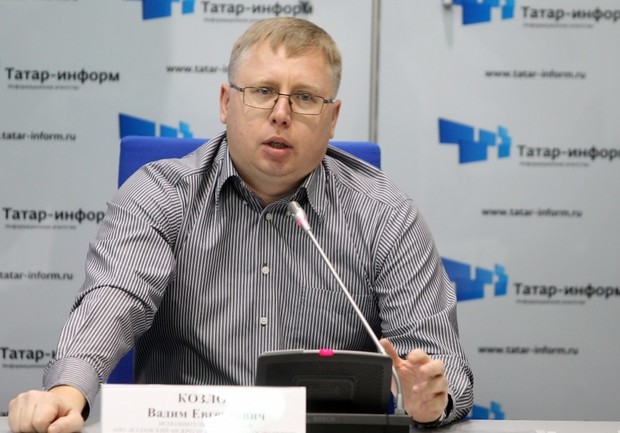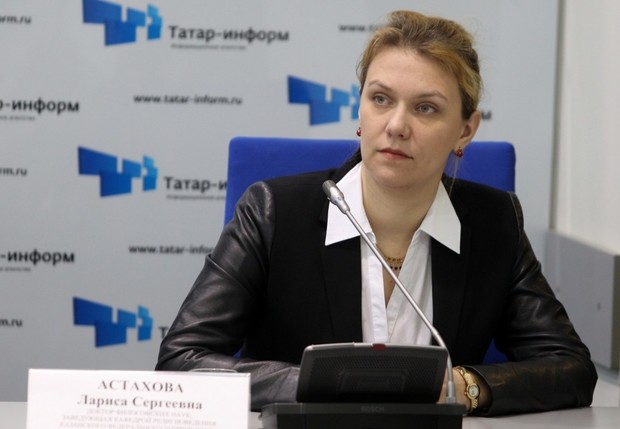Rustam Batrov: ‘Two members of Hizb ut-Tahrir were given party membership cards personally by Zyuganov’
First deputy mufti of Tatarstan notices that ‘Wahhabis are where there is petroleum’
What are the goals of the organization of non-traditional religious orientation? In what Districts of Tatarstan Wahhabis are concentrated? What is the connection of the members of Hizb ut-Tahrir (the organization is prohibited in Russia) with the communist party? Speakers of a press conference held in Kazan tried to answer these questions.
'Non-traditional' renascence
Religious identity in the Republic of Tatarstan was the name of the press conference where religious experts and representatives of two traditional religions – Islam and Orthodoxy – took part.
According to the executive director of the Interregional Centre of Expertise of Kazan Vadim Kozlov, a religious renascence began in the country after the dissolution of the Soviet Union. In addition, religious waves started to penetrate Russia, including 'non-traditional' ones.
As he estimates, nowadays several thousand residents are supporters of non-traditional religions only in Tatarstan.
'We have entered a new development phase since 2014: reunification with Crimea, civil war in Ukraine, foreign policy background and economic changes,' said Kozlov. 'The activity of a number of non-traditional religious movements activated on the wavelength of crises. In the republic, these movements became active again in spring-summer. Unauthorized ads appeared. Emissaries from Ukraine and non-CIS countries came. Preachers and overseers, who established their work, began to appear. Their activity on the Internet increase: the number of the participant of their interest group has been 2,5 times higher.'

The head of the Department of Religious Studies of the Kazan Federal University Larisa Astakhova disagreed with Kozlov in a talk to the correspondent of Realnoe Vremya. In addition, she noted that these religious emissaries have different goals: first of all, political and economic. Centres of many such organizations are located in the USA and Ukraine.
'Wahhabis are where there is petroleum'
The first deputy chairman of Muslim Spirituality Directorate of Tatarstan Rustam Batrov's statement was the most unexpected. Citing an investigator of a scientific conference, he noted that, 'Wahhabis are where there is petroleum'.
He put an example of Tatarstan. In his opinion, Wahhabis were more active in the regions of developed petrochemical industry – Nizhnekamsk and Almetyevsk. They had showed themselves in Chechnya and other petrochemical regions.
'There is a feeling that somebody had a map and just placed the future centres of this influence, created its lobby and moved this ideology to the zones of important strategic and economic interests of our country,' the religious scholar concluded.

Caliphate and communism in one
What is more, Batrov informed about Kazan members of Hizb ut-Tahrir who (suddenly!) turned out to be communists. He told he met with them. They don't hide that they are advised from abroad via social nets and their media centre is situated in London.
We have such a famous political and religious movement Hizb ut-Tahrir. You might remember how they organized a demonstration with black flags. I think these people are away from the authentic faith. All these forces use a certain psycho type of people. As for Hizb ut-Tahrir, one and the same person, who had 'I'm for caliphate!' T-shirt, walked on Baumana Street before the Universiade to cause a certain resonance. The same person defended the interests of the Communist Party at elections. There was a scandal recently: Zyuganov came, and two members of Hizb ut-Tahrir joined the Communist Party. Zyuganov personally presented them their party membership cards. When Zyuganov knew about it, they were removed.
According to Hazrat Rustam, such people appear where they could shout and create scandals.
'If it is a religious activity, they can walk with black flags. If they are communists, they could join to satisfy their need in shouts. It is a real fact, and it all happens in Kazan. We are not speaking about faith, religious ideals. There are just certain psychological types of people, need in a certain opposition, scandal and provocative component. They go to a place where it might be fulfilled, including the religion,' the first deputy mufti resumed.